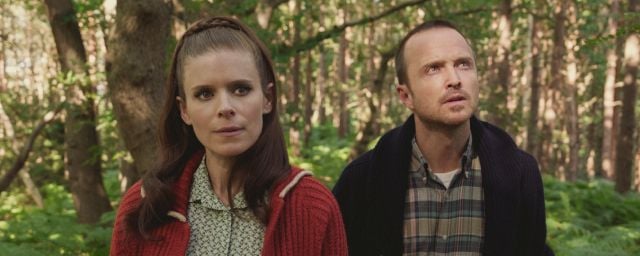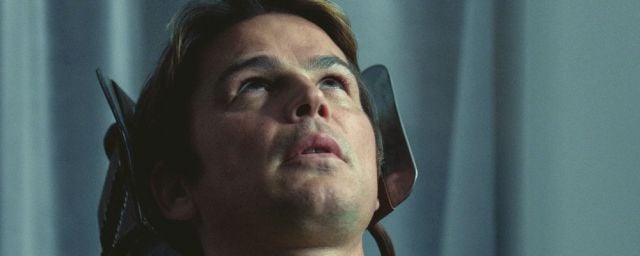Episode 3 of season 6 of Black Mirror surprised more than one and yet “My heart for life” is based on a traumatic event that we have all experienced! Warning, spoilers.
Warning, spoilers. It is advisable to have seen episode 3 of season 6 of Black Mirror before continuing to read this article.
It took four years to discover new episodes of Black Mirror, but they are there! Season 6 of Charlie Brooker’s anthology series is available on Netflix and it contains five episodes, with very different themes.
The third episode, entitled “My heart for life” (“Beyond the sea”, in the original version), is the longest (80 minutes!) but it is above all the one that has perhaps won the hearts of the fans the most. and surprised subscribers.
It remains close to the themes that make the salt of Black Mirror, with a critique of new technologies, but also offers a plot that takes the audience into an alternative past, with a very contemporary subtext. And above all, “My heart for life” ends with a mind-blowing twist and a shocking end.
Black Mirror season 6 episode 3 seems too familiar to you? It’s normal !
“My heart for life” is set in an alternate version of the year 1969, where the technology is very advanced for the time. Two astronauts, Cliff (Aaron Paul) and David (Josh Hartnett), are tasked with a perilous high-tech mission in space.
To allow them to continue living a normal life when they have no space task to do, robotic doubles have been designed and it is these android replicas that live on Earth with their respective families while their real bodies are at rest. in space for their mission, which is supposed to last six years.
Their consciousnesses can be transferred from their real bodies when they have to work in Space to their robotic doubles to live with their loved ones when they are not in action.
But that delicate balance is upset when David’s family is attacked and killed by a cult of hippie fanatics whose leader believes David’s robot is unnatural.
netflix
Before turning themselves in to the police, the killers burn David’s replica, which strands the real David in space and prevents him from returning to Earth before the mission’s completion four years later. Cliff tries to help him, but David sinks into a deep depression being locked in the space shuttle alone.
His wife Lana (Kate Mara) suggests that Cliff play the role of David for a few visits to Earth so that he can find a taste for life again. Except that David, in Cliff’s body, not only revives, he also gets dangerously close to Lana and even develops an obsession for her that he transcribes in his drawings.
When Cliff finds out, he forbids David to take back his line. David then hatches a scheme to block Cliff in space while he returns to Earth to kill Lana and Henry, Cliff’s son. Completely bruised, Cliff however has no choice but to stay in the shuttle with David to complete the mission since David could kill his real body in his absence.
In addition to specific historical inspirations for the plot of “My heart for life”, such as the year 1969 when Man took the first step on the Moon or Charles Manson as the leader of a hippie cult, Charlie Brooker is above all inspired by a much more contemporary event to write this episode: confinement.

netflix
During an interview for The Hollywood ReporterJosh Hartnett explained what the creator of Black Mirror told him:
“He wrote it during the lockdown as a reaction to the lockdown. He felt isolated and – he probably won’t say – I think he had a bit of FOMO syndrome [Fear Of Missing Out, une anxiété sociale caractérisée par la peur de manquer quelque chose d’important, ndlr] by looking at the lives of others in the world.
And he thought maybe you’re comparing your own situation to someone else’s situation. […] It’s a situation people find themselves in when they’re isolated on their social media, and I think it was a reaction to that paradoxical feeling of isolation and presence on social media.”
Even though it is set in 1969, Kate Mara finds this episode “very relevant and universal” even though it is based on the recent traumatic experience of the coronavirus pandemic and subsequent lockdown:
“The theme of human connection is as relevant in the 60s as it is today. […] It is important for all of us to survive and to love. Not just in a romantic relationship, but to feel loved and to experience love.
That’s what I found so fascinating about it but also watching these two men experience isolation and also my character, Lana, experience isolation in her own home.”

netflix
The episode “My heart for life” takes an extremely tragic and destructive turn for the characters and all hope of happiness is annihilated at the end. Despite the inspiration of confinement, Josh Hartnett explains that the choice of the year 1969 was carefully considered by Charlie Brooker:
“Hope and optimism were quashed by this Manson murder. Because at that time the space program was the great hope of the American people and the hope of humanity, in a way. It was state-of-the-art at the time; people going to space meant something, like if we were all going to colonize the Moon or live in the Jeston future.
The 1960s put an end to optimism, to hope. The whole experiment ended with the Manson murders. It was the end. And I think that great experiment ended so long ago, that Charlie wanted to go back to that time to reinvent and then, of course, set up that theme of isolation.”
Black Mirror Season 6 is available on Netflix.
